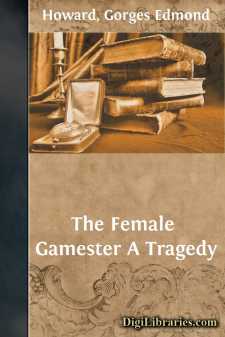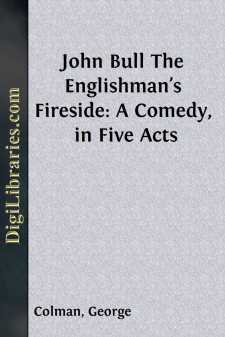Drama
- American 43
- Ancient, Classical & Medieval 45
- Asian 7
- Caribbean & Latin American 2
- Continental European 50
- English, Irish, Scottish, Welsh
- General 105
- Middle Eastern 1
- Religious & Liturgical 1
- Shakespeare 1
English, Irish, Scottish, Welsh Books
Sort by:
ACT I. SCENE I. Mr. ANDREWS's house. Enter MARIA and THOMAS. MARIA. But why these moping, melancholy looks?Each eye observes and marks them now unseemly,Whilst every countenance but your's speaks joy,At the near wedding of our master's daughter.Sure none so well deserv'd this noble prize:And young lord Weston will be bless'd indeed. THOMAS. It has been countermanded. MARIA....
more...
ACT IV SCENE I. London. Before the Tower [Enter, on one side, QUEEN ELIZABETH, DUCHESS of YORK, and MARQUIS of DORSET; on the other, ANNE DUCHESS of GLOSTER, leading LADY MARGARET PLANTAGENET, CLARENCE's young daughter.]DUCHESSWho meets us here?—my niece Plantagenet,Led in the hand of her kind aunt of Gloster?Now, for my life, she's wandering to the Tower,On pure heart's love,...
more...
by:
John Galsworthy
ACT I The MARCH'S dining-room opens through French windows on one of thosegardens which seem infinite, till they are seen to be coterminouswith the side walls of the house, and finite at the far end, becauseonly the thick screen of acacias and sumachs prevents another housefrom being seen. The French and other windows form practically allthe outer wall of that dining-room, and between them and the...
more...
by:
John Galsworthy
ACT I SCENE I The scene is a well-lighted, and large, oak-panelled hall, withan air of being lived in, and a broad, oak staircase. Thedining-room, drawing-room, billiard-room, all open into it; andunder the staircase a door leads to the servants' quarters. Ina huge fireplace a log fire is burning. There are tiger-skinson the floor, horns on the walls; and a writing-table againstthe wall opposite...
more...
by:
John Galsworthy
ACT I The time is morning, and the scene a level lawn, beyond whichthe river is running amongst fields. A huge old beech treeovershadows everything, in the darkness of whose hollow manythings are hidden. A rustic seat encircles it. A low wallclothed in creepers, with two openings, divides this lawn fromthe flowery approaches to the house. Close to the wall there isa swing. The sky is clear and sunny....
more...
by:
John Galsworthy
ACT I SCENE I The dressing-room of CHARLES WINSOR, owner of Meldon Court, nearNewmarket; about eleven-thirty at night. The room has pale greywalls, unadorned; the curtains are drawn over a window Back LeftCentre. A bed lies along the wall, Left. An open door, Right Back,leads into LADY ADELA's bedroom; a door, Right Forward, into a longcorridor, on to which abut rooms in a row, the whole length of...
more...
THE GAY LORD QUEX THE FIRST ACT The scene represents a manicure establishment in New Bond Street. It is a front room upon the first floor, with three french-windows affording a view of certain buildings on the east side of the street. On the left, furthest from the spectator, is a wide, arched opening, apparently leading to another apartment, in which is the door giving entrance to the rooms from the...
more...
by:
Francis Beaumont
Actus primus. Scena prima. Enter Uncle and Merchant. Merc. When saw you Valentine? Uncle. Not since the Horse-race, he's taken up with those that woo the Widow. Mer. How can he live by snatches from such people? he bore a worthy mind. Uncle. Alas, he's sunk, his means are gone, he wants, and which is worse,Takes a delight in doing so. Mer. That's strange. Unc. Runs Lunatick, if you but...
more...
by:
George Colman
JOHN BULL. ACT THE FIRST. SCENE I. A Public House on a Heath: over the Door the Sign of the Red Cow;——and the Name of "Dennis Brulgruddery." Enter Dennis Brulgruddery and Dan, from the House. Dan opening the outward Shutters of the House. Dennis. A pretty blustratious night we have had! and the sun peeps through the fog this morning, like the copper pot in my kitchen.—Devil a traveller do...
more...
by:
Bernard Shaw
As will be seen later on, Pygmalion needs, not a preface, but a sequel, which I have supplied in its due place. The English have no respect for their language, and will not teach their children to speak it. They spell it so abominably that no man can teach himself what it sounds like. It is impossible for an Englishman to open his mouth without making some other Englishman hate or despise him. German...
more...











